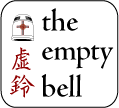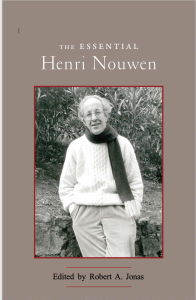Selected Books & Articles
Books by Robert A. Jonas
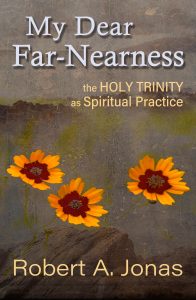 My Dear Far-Nearness: the HOLY TRINITY as Spiritual Practice, Orbis Books, 2022.
My Dear Far-Nearness: the HOLY TRINITY as Spiritual Practice, Orbis Books, 2022.
I have written this book in my 76th year. I use the language domains of Christian theology, psychodynamic psychotherapy, Buddhist meditation, and direct spiritual experience as a contemplative. I have wondered, “What is the Holy Trinity” my whole life, continuously navigating away from and toward accepted theological understandings. I begin this exploration with reading the Hebrew and Christian scriptures, moving on to the Creeds that proclaim God as Triune, further on into a deep reading of various Christian mystics beginning with St. Augustine, still further on into decades of contemplative Christian and Buddhist practice as a direct witness of holy Presence, and finally into the life of Oscar Schindler, the German Nazi who was transformed in Trinitarian Presence and saved the lives of hundreds of Jewish prisoners.
Most understandings of the Holy Trinity are theological and conceptual, as if the Trinity is out there, somewhere separate from us in a faraway Heaven. I take a different tack here, following the work of Augustine, Aquinas, Raimundo Panikkar, and Professor S. Mark Heim, exploring the reality of the Holy Trinity as three dimensions of our awareness—an awakened consciousness that puts us in direct contact with the experience that St. Paul called “the mind of Christ,” (“We have the mind of Christ,” 1 Corinthians 2:16)
I wrote this book about Henri Nouwen ten years after the Orbis publication (see below). Shambhala Publications asked me to write something about Henri for Buddhist and interfaith audiences, and it was a pleasure to keep the Christian-Buddhist dialogue in mind as I wrote.
This book includes an Introduction by me, followed by chapters named for major themes discussed by Henri in his decades of ministry and in his almost 35 books. I introduce each topic category with an introduction, and sometimes with glimpses of my memories as one of Henri’s many friends.
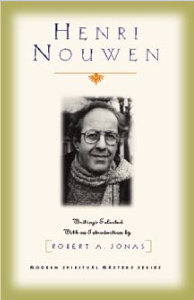 Henri Nouwen: Writings Selected with an Introduction by Robert A. Jonas, Orbis Books, 1998.
Henri Nouwen: Writings Selected with an Introduction by Robert A. Jonas, Orbis Books, 1998.
I wrote this book in 1998. It was published by Orbis Books two years after Henri’s death in September, 1996. Henri and Jonas had been friends since Henri’s days at Harvard Divinity School in 1982-1985. In the fall of 1995 Henri lived with our family in Watertown, MA. While living with us he would walk across the yard to the carriage house, which I had remodeled into the Empty Bell sanctuary, and he would create a Eucharist. Sometimes I would attend, and sometimes others would want to be with us. A few days after Henri’s death, National Public Radio asked to to announce Henri’s death, and to say few words about him: https://n.pr/3hQHxlu
This book includes an Introduction by Jonas, followed by all major topics discussed by Henri in his decades of ministry and in his almost 35 books. Each topic category includes an introduction by Jonas, and quotes from Henri’s books.
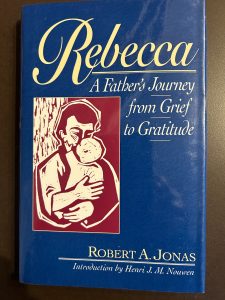 Rebecca: A Father’s Journey from Grief to Gratitude, Crossroad Publishing, 1996.
Rebecca: A Father’s Journey from Grief to Gratitude, Crossroad Publishing, 1996.
In the early 1990’s I and my wife, Rev. Dr. Margaret Bullitt-Jonas eagerly awaited the birth of their second child, Rebecca. Tragically, Rebecca was born too early, and died in our parent’s arms in a Boston hospital. This is Rebecca’s story, with a Foreword by Henri J.M. Nouwen.
Henri’s Foreword: This is a book about grief, but also about gratitude; about anger, but also hope; about fear, but also about love; about loss, but also about gain; about powerlessness, but also about power; about time, but also about eternity. It is a book about hospital rooms, but also about the universe. It is a book about being human, but also about being divine.
Dr. Jonas, contributing author
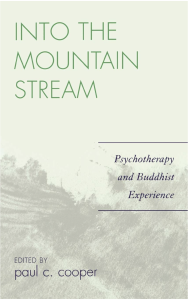 Into The Mountain Stream: Psychotherapy and Buddhist Experience,
Into The Mountain Stream: Psychotherapy and Buddhist Experience,
Writing this chapter was a chance to reflect on my Christian life as it has evolved from a working class childhood in Wisconsin to Luther College, Dartmouth College, Harvard and the Weston Jesuit School of Theology. And a chance to reflect on the glimpses of Self-knowing and wisdom I have gained from my German Lutheran grandparents, to my training in Taoist meditation and Tai Kwan Do karate, to my life as a farmer, to my conversion to the Roman Catholic tradition as a Third Order Carmelite, to my Vipassana Buddhist training, to my experiences in Zen meditation, to my Harvard education as a psychodynamic therapist, to my own psychotherapy experiences, to my friendship with the well-known Catholic priest and author, Henri Nouwen, to my marriage with Rev. Dr. Margaret Bullitt-Jonas, an Episcopal priest, to my post-doc work in the interfaith territory of Buddhist-Christian-psychotherapeutic dialogue, to my training in Sui-Zen practice as a shakuhachi flute performer, to my establishment of the Empty Bell sanctuary for Buddhist-Christian dialogue and practice.
Dr. Jonas has hosted the Empty Bell community from 1994 (in Watertown, MA) to 2023 (in Northampton, MA), at EmptyBell.org and also at MyDearFar-Nearness.org.
 Beside Sill Waters: Jews, Christians, and the Way of the Buddha: Boston: Wisdom Publications, 2003.
Beside Sill Waters: Jews, Christians, and the Way of the Buddha: Boston: Wisdom Publications, 2003.
Beside Still Waters: Jews, Christians, and the Way of the Buddha is a unique and meaningful contribution to interfaith dialogue. Rather than offering research or lectures, Beside Still Waters takes a deeply personal approach, allowing the reader to delve into the individual experiences of fourteen Jews and Christians ( seven each) whose encounters with Buddhism have truly impacted their sense of religious identity.
Dr. Jonas’s chapter, “Loving Someone You Can’t See,” navigates the experiential zone of awareness between Christian kenosis (Greek: self-emptying of Christ), and Zen Buddhist śūnyatā (Sanskrit: In Mahāyāna Buddhism, śūnyatā refers to the tenet that “all things are empty of intrinsic existence and nature (svabhava). Jonas brings special attention to his playing of the shakuhachi flute. He performs this ancient Japanese meditative practice called Sui-Zen as both a Zen practitioner and a Christian contemplative.
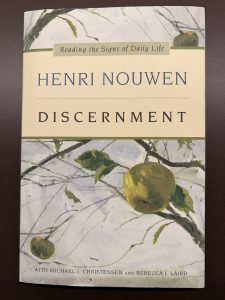 Discernment: Reading the Signs of Daily Life, (Harper One, 2013)
Discernment: Reading the Signs of Daily Life, (Harper One, 2013)
This book features the wisdom that spiritual leader and counselor Henri J. M. Nouwen brought to the essential questions asked by every Christian and seeker: “Who am I,” and “What should I do with my life?” Nouwen emphasizes listening to the Word and Presence of God—in our hearts, in the Bible, in the community of faith, and in the voice of the poor as a way to discern God’s plan.
Nouwen’s friend, Dr. Robert A. Jonas, writes the Foreword and Appendix C: “Spiritual Friendship and Mutual Discernment.” Jonas shares stories about how he and Nouwen influenced and supported each other, especially times of stress and confusion. He emphasizes how we sometimes discern our paths individually, and sometimes in partnership with friends, family, and spiritual mentors.
Although the late Henri J. M. Nouwen counseled many people during his lifetime, his principles of discernment were never collected into a single volume. Now, Michael Christensen and Rebecca Laird have taken Henri’s coursework, journals, and unpublished writings to create this and other books in a series of books that explore God’s will for your life.
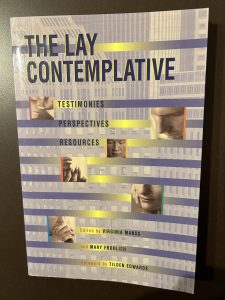 The Lay Contemplative: Testimonies, Perspectives, Resources. Cincinnati OH: St. Anthony Messenger Press, 2000.
The Lay Contemplative: Testimonies, Perspectives, Resources. Cincinnati OH: St. Anthony Messenger Press, 2000.
L’Arche is non-profit organization composed of 154 member communities around the world. This organization, originally only Roman Catholic and now interfaith, was created to provide caring homes for handicapped people who are generally marginalized by their surrounding communities. In Jonas’s chapter he reflects on his experience as a psychologist at Wrentham State School in Massachusetts, and on the needs of handicapped men and women–an experience he gained as he received clinical supervision for his doctorate in psychology and education at Harvard University in the mid-1980’s.
In the winter of 1992, at the invitation of Fr. Henri Nouwen, Dr. Jonas visited Daybreak, a L’Arche community in Toronto, Canada. He limped into the community as one who was handicapped by grief. It had been only three months since he and Margaret had lost their daughter Rebecca to a premature birth and death in Boston. Rebecca had lived only four hours and died in their arms. Now, he had come to Daybreak to be among his own kind, the broken and marginalized.
While at Daybreak Jonas participated in daily Eucharists, listened and spoke with many of the residents and staff, and played the shakuhachi, the Zen flute which he always carried. This chapter is a short story of how he navigated Christian and Buddhist meditation and prayer as he made friends with handicapped residents and mourned the death of his daughter, Rebecca.
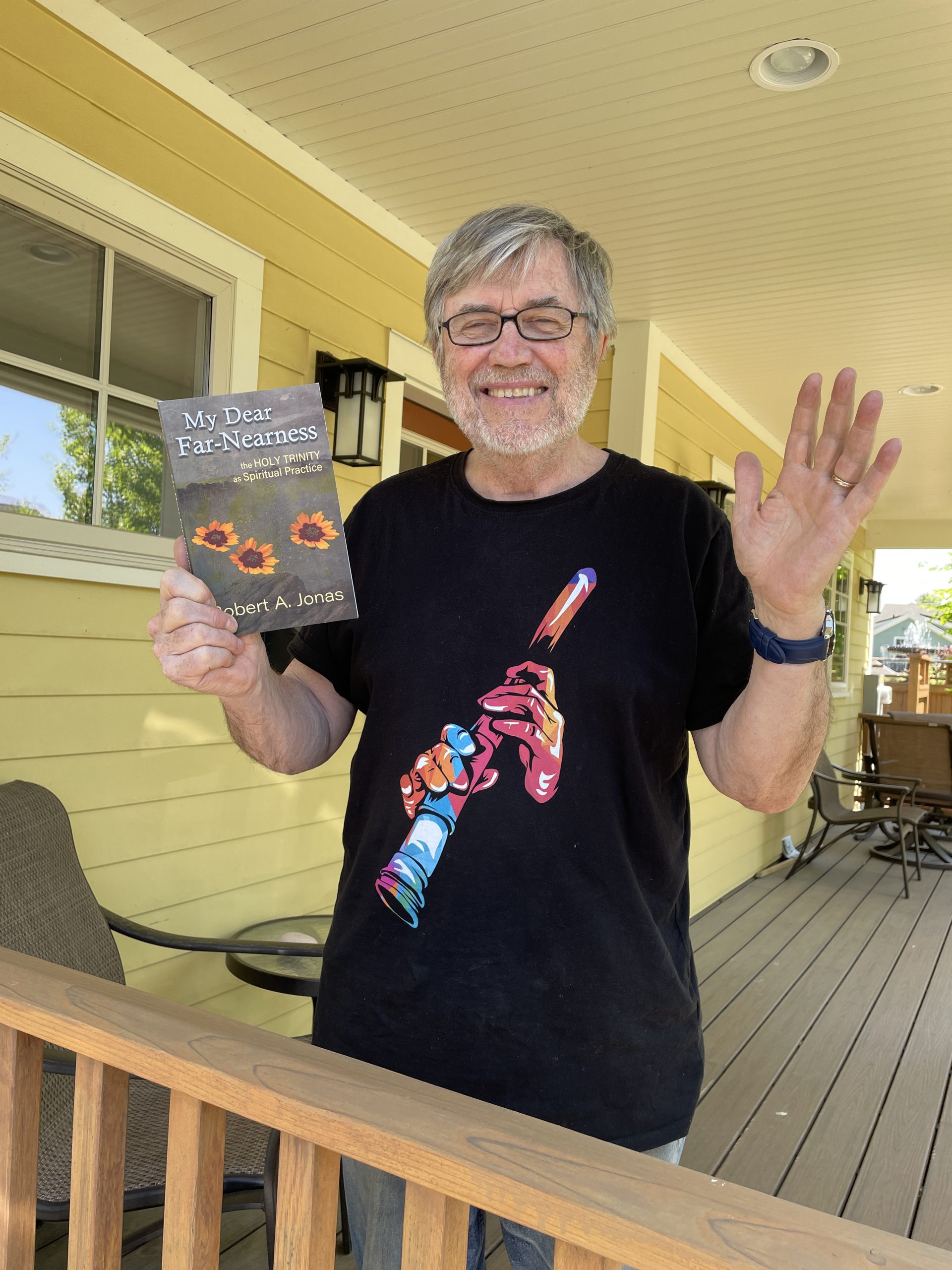
Photo credit: Robert A. Jonas

“Misty Ocean Flute”
read more
